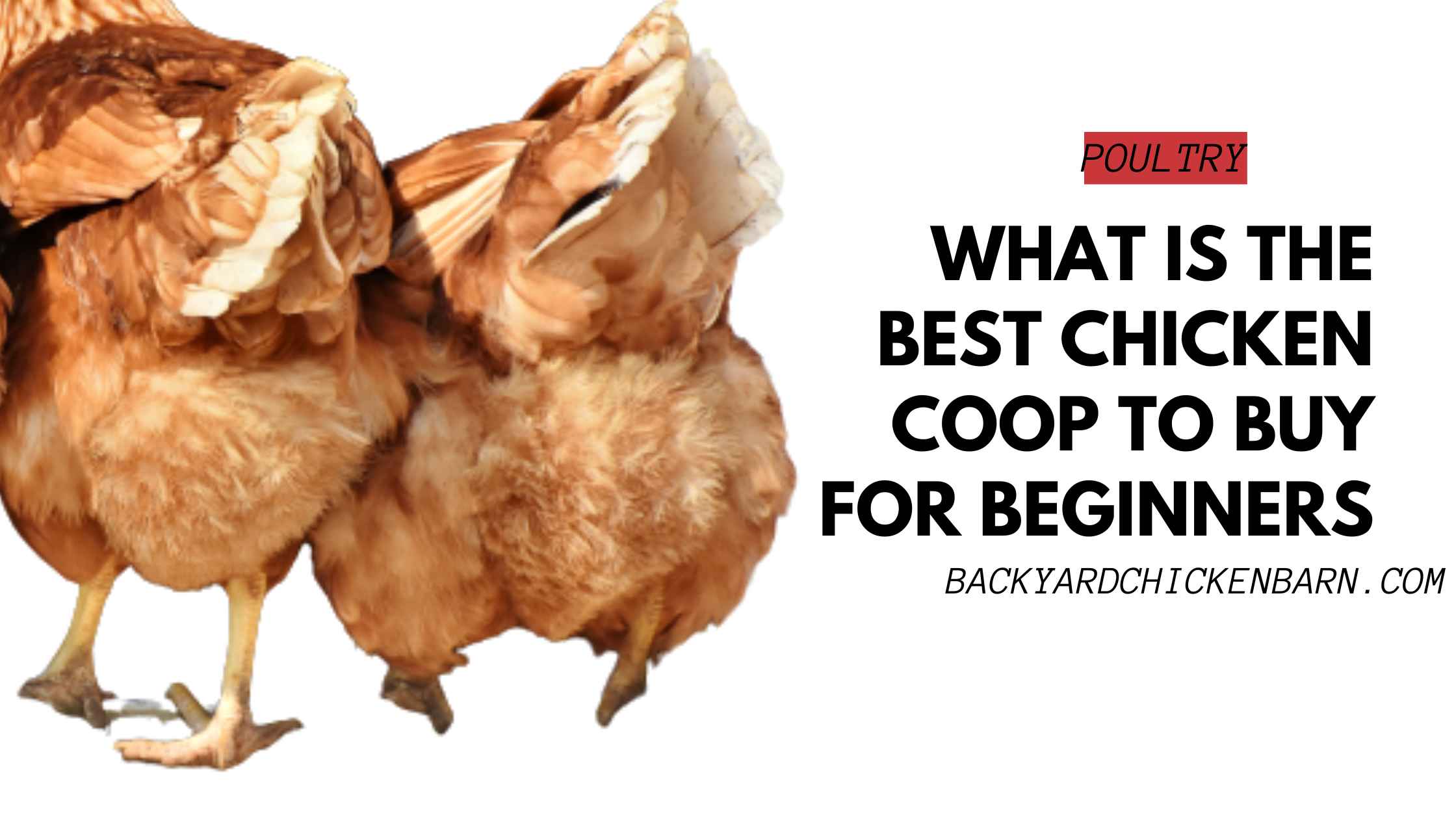What is the Best Chicken Coop to Buy for Beginners?
I remember the sheer excitement mixed with apprehension when I decided to raise chickens.
As someone stepping into the world of poultry for the first time, one of my primary concerns was: “Which chicken coop should I buy?”
After hours of research and speaking to fellow poultry enthusiasts, I have found some invaluable insights that I believe every beginner would benefit from.
If you are looking for a direct answer: The best chicken coop for a beginner is one that is easy to assemble, provides adequate ventilation, has predator-proof latching mechanisms, and is appropriately sized for the number of chickens you intend to keep. Prefabricated or ‘pre-made’ coops often serve as a great starting point for newbies.
But let’s delve a little deeper. When I started, I was inundated with choices, from DIY kits to luxury chicken mansions. So, how do you decide? Here’s a breakdown based on my experience:
1. Size and Space
For a beginner, starting small is wise. Look for a coop that can comfortably house 4-6 chickens. Each chicken requires 2-3 square feet inside the coop and about 10 square feet in an outdoor run.
2. Ease of Assembly
You don’t want to be stuck with a complicated jigsaw puzzle. The best coops for beginners come with clear instructions and require minimal tools.
If DIY isn’t your thing, consider buying a pre-made coop.
3. Accessibility
Ensure that the coop has doors that allow you easy access to both chickens and eggs. A hinged roof or easily opened side panels can make cleaning and maintenance a breeze.
4. Ventilation and Insulation
Chickens need fresh air, but they also need protection from drafts. A well-designed coop has vents positioned above roosting level and provides adequate insulation, especially if you live in colder climates.
5. Predator Protection
This was a crucial lesson for me. Ensure the coop has a secure latch and consider a design that includes a wire mesh skirt around the base to deter digging predators.
6. Materials
Wood is the most common material and provides good insulation. However, ensure it’s treated to resist pests and decay. Some modern coops use plastic, which can be easier to clean and doesn’t harbor mites.
7. Reviews and Recommendations
Lastly, don’t underestimate the power of community. Join poultry forums or local groups, and ask for recommendations. Real-world reviews helped me avoid some potentially costly mistakes.
In conclusion, starting your poultry journey is exhilarating. The right coop not only ensures the well-being of your feathered friends but also sets the tone for a smooth and enjoyable experience. Remember, the best coop is one that fits both your chickens’ needs and your own. Happy chicken keeping!
ALSO SEE: When Can Chicks Go in Coop with Other Chickens?

FAQs: Best Chicken Coop for Beginners
1. What’s the best chicken coop for a beginner?
The best chicken coop for a beginner is one that’s easy to assemble, provides adequate ventilation, is predator-proof, and sized appropriately for your chickens. Prefabricated or ‘pre-made’ coops are often recommended for newbies.
2. How many chickens can a beginner’s coop hold?
A beginner’s coop should comfortably house 4-6 chickens.
3. How much space does each chicken need inside the coop?
Each chicken requires 2-3 square feet inside the coop.
4. How much outdoor space should each chicken have in a run?
Each chicken should have about 10 square feet in an outdoor run.
5. Are DIY coop kits advisable for beginners?
If you’re comfortable with assembling, DIY kits can be a good option. However, for absolute ease, pre-made coops might be more suitable.
6. Why is accessibility important in a coop?
Accessibility ensures easy access to chickens and eggs and simplifies cleaning and maintenance.
7. How can I ensure proper ventilation in my coop?
Ensure the coop has vents positioned above roosting level. Adequate ventilation helps in providing fresh air while protecting against drafts.
8. Why is insulation important in a coop?
Insulation protects chickens in colder climates, ensuring they aren’t exposed to extreme cold.
9. How do I protect my chickens from predators?
Look for coops with secure latches and consider designs with a wire mesh skirt around the base to deter digging predators.
10. Are wooden coops better?
Wood is a common material that provides good insulation, but it should be treated to resist pests and decay.
11. Are plastic coops any good?
Plastic coops can be easier to clean and don’t harbor mites, making them a viable option for some chicken keepers.
12. How do I know if a coop is easy to assemble?
Check for clear assembly instructions and minimal tool requirements.
13. Why should I consider pre-made coops?
Pre-made coops offer convenience and are typically designed with the beginner’s needs in mind.
14. Can drafts harm my chickens?
Yes, drafts can be harmful, especially in colder climates. Ensure your coop protects against them.
15. What should I look for in coop reviews?
Look for real-world experiences, ease of assembly, durability, and how well the coop protects against predators.
16. Are there any online forums for chicken keepers?
Yes, many poultry forums and local groups can offer advice and recommendations.
17. How do I clean a wooden coop?
Wooden coops can be cleaned using mild soapy water and scrubbing brushes. Ensure it’s thoroughly dried to prevent mold.
18. How often should I check for predators?
Regularly inspect your coop for signs of attempted break-ins or weak points.
19. Can I expand my beginner’s coop later on?
Some coops offer expansion modules or can be DIY modified, but it’s essential to plan ahead.
20. Are mobile coops suitable for beginners?
Mobile coops, or ‘chicken tractors,’ can be great for beginners, allowing chickens to access fresh grass while staying protected.
21. How do I choose the right location for my coop?
Choose a location that offers some shade, protection from strong winds, and is elevated to avoid water logging.
22. Do all coops come with nesting boxes?
Most coops will include nesting boxes, but always check the specifications.
23. What’s the benefit of a hinged roof?
A hinged roof can make cleaning and accessing the inside of the coop much easier.
24. Should I consider adding an automatic door?
Automatic doors can provide added security against predators, especially if you’re not always home during dusk and dawn.
25. How do I know if my coop has good insulation?
Check reviews, product details, and ask the manufacturer or seller about insulation properties.
26. How often should I clean my coop?
A thorough cleaning should be done every few weeks, but spot cleaning should be regular.
27. Can I paint my coop?
Yes, but use non-toxic paints and ensure good ventilation while the paint dries.
28. How do I treat wood to resist pests?
Use non-toxic wood treatments or sealants available at most hardware stores.
29. Can I add more vents to my coop?
Yes, but ensure they’re positioned correctly to prevent drafts on the roosting chickens.
30. What materials should I avoid in a coop?
Avoid materials that can’t withstand outdoor conditions or those that might be toxic to chickens.
31. Do coops need a specific orientation?
Ideally, position your coop to get morning sunlight and protection from prevailing winds.
32. Are two doors better than one for a coop?
Having two doors can improve accessibility and can serve as an emergency exit.
33. How deep should a coop’s foundation be?
It varies, but a few inches deep with gravel can help with drainage.
34. Do I need to winterize my coop?
In colder climates, consider winterizing by adding extra insulation and ensuring adequate ventilation.
35. How can I make my coop more secure?
Regular inspections, sturdy locks, and motion-activated lights can deter predators.
36. Can I use my coop for other birds?
While primarily designed for chickens, some coops can house quails or other small birds.
37. Is it okay to place the coop near my house?
Yes, as long as you ensure cleanliness and check local regulations.
38. Can I build a run later?
Yes, many chicken keepers expand by adding a run to their existing coop.
39. How can I make my coop more environmentally friendly?
Use sustainable materials, and consider adding a rainwater harvesting system or green roof.
40. How do I ensure good drainage for my coop?
Elevate the coop slightly and consider placing it on gravel for better drainage.


